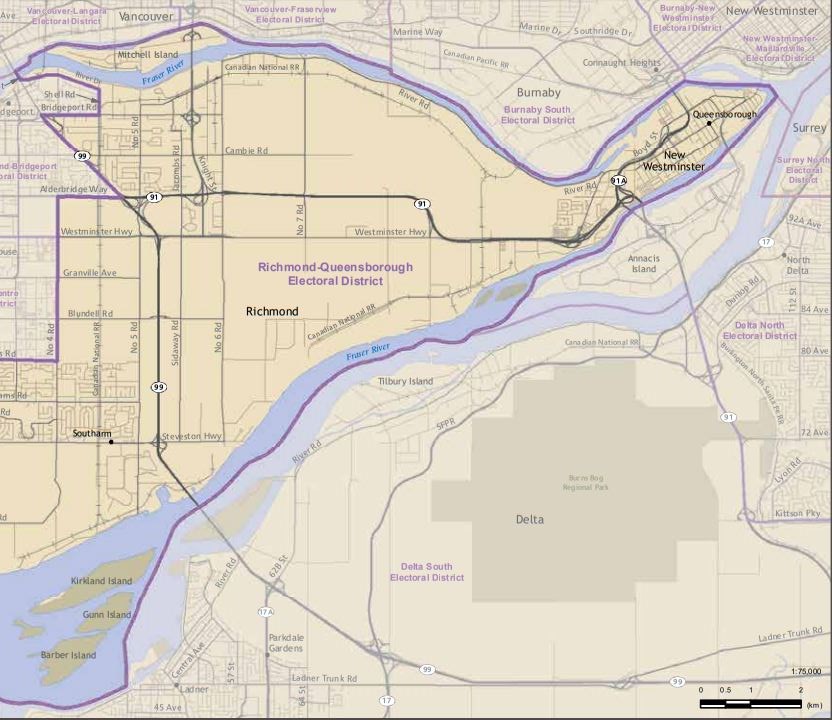The BC Electoral Boundaries Commission appreciates the input from folks at its Nov. 2 meeting in New West – and it hopes to hear from more British Columbians in the coming weeks.
On Oct. 3, the commission published its preliminary report with recommendations for changing British Columbia’s provincial electoral districts for the next two provincial general elections. That includes creating six additional electoral districts (increasing the number of ridings from 87 to 93) and adjusting the boundaries of 71 electoral districts (based on the geographic, demographic, communication and transportation considerations set out the in Electoral Boundaries Commission Act.)
Five people made presentations to the commission at Wednesday’s public meeting at the Inn at the Quay, including Mayor-elect Patrick Johnstone, school trustee Maya Russell, the City of New Westminster intergovernmental and community relations manager and a local resident. The four speakers from New West expressed concerns about the plan to divide New Westminster residents into five ridings.
Nitya Iyer, chair of the commission, said the three-person commission valued the feedback about what’s being proposed in New West.
“I was really impressed, I think we all were today, with the thoughtfulness and the specificity of the submissions, because they identify things in a way that we can't because we aren't from everywhere in the province,” she said. “And, although some of us will know different areas better than others, it is really interesting and important to hear from people about what the impact is for them living in these places. And so I really, really, really appreciated that.”
Speaking to the Record after the meeting, Iyer said comments about proposals that relating to the Connaught Heights and Mott Crescent neighbourhoods were very specific.
“When we hear the kinds of submissions we heard today, that related directly to representation by population and effective representation in the provincial legislature, that's really useful. And we take that – we really do think about all of that from all of what we've heard – it's just that the views of people in New West may not be the same as the views of people in other areas,” she said. “And sometimes they have opposing interests; sometimes they don't.”
Iyer said part of the challenge for New Westminster is that it’s part of a very dense a Lower Mainland, an area where the commission is proposing to add four new ridings.
“The reason for that is overpopulation, as judged by our legislation. They're just overly crowded districts,” she said. “And, so, if you're putting four new districts into a geographic area, it's going to mean that all the other ridings in that area have to change, the boundaries have to change. Because you can't just plunk in four and not have consequential changes, and that was the real challenge for us. And so that, doing that having people tell us what we think we can go back and see, can we do better in terms of making more rational, appropriate boundaries in light of our objectives.”
Input wanted
The BC Electoral Boundaries Commission is encouraging British Columbians to provide input into proposed changes to electoral boundaries across the province.
In addition to in-person public hearings, people can also make their thoughts known at a virtual meeting on Tuesday, Nov. 8.
For those who are unable to attend public meetings, the commission invites British Columbians to provide input by completing an online survey or by writing to the commission directly by email or post. You can get all the details and access the survey at www.bcebc.ca.
All public input must be received by 11:59 p.m. on Nov. 22.
“We really value the input,” Iyer told the Record. “I don't mean to sound hokey about it, but it's just it really does make a huge difference. As did travelling the whole province in the first round. We learned a lot.”
The BC Electoral Boundaries Commission’s final report must be released by April 3, 2023. It will then be up to the Legislative Assembly to decide whether to accept all, some or none of the commission’s recommendations.
“I think, given the nature of this challenge, not everybody's going to be happy. We do have to make some difficult choices,” Iyer said. “But in the end, it is the Legislature that decides.”


